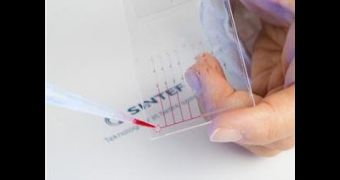A Norwegian company had the idea of creating a chip that will make sending blood analysis or cancer cell samples to the laboratory obsolete.
The MicroActive project is part of the European Union's 6th IST Framework Program, to develop an instrument for molecular diagnostics that can be used in the doctors’ office, and it has come up with an integrated system based on microtechnology and biotechnology, that will allow patients to have an 'on the spot' diagnosis.
The researchers have used cell samples to diagnose cervical cancer for their study, but the chip can, in principle, verify several diseases caused by bacteria or viruses, as well as other types of cancer.
The coordinator of the project was SINTEF, along with hospitals, universities and research facilities in Germany and Ireland, AlphaGalileo reports.
The Norwegian NorChip company came up with the concept, and also conducted full-scale test during the project.
This 'health chip' looks like a credit card, except it is engraved with very narrow channels that contain chemicals and enzymes in the correct proportions for each individual analysis, in other words, everything that would be necessary in a real laboratory.
Once the patient's sample is drawn into these channels, the reagents are mixed.
Liv Furuberg and Michal Mielnik of SINTEF, say that “the health chip can analyze your blood or cells for eight different diseases.
“What these diseases have in common is that they are identified by means of special biomarkers that are found in the blood sample.
“These 'labels' may be proteins that either ought or ought not to be there, DNA fragments or enzymes.
“This little chip is capable of carrying out the same processes as a large laboratory, and not only does it perform them faster, but the results are also far more accurate.
“The doctor simply inserts the card into a little machine, adds a few drop of the sample taken from the patient via a tube in the cardholder, and out come the results.”
This 'health chip' is a real revolution that highly simplifies today's resource- and time-consuming methods.
When people have their blood tests, their blood sample is submitted to a variety of very complex procedures, like heat treatment, centrifugation, mixing with enzymes and concentration of disease markers.
This cannot be done in a doctor's office so the samples are sent to central laboratories for analysis, and the results may come back weeks later.
The Norwegian company has already started a new EU project, which will last for another two years and whose goal is to industrialize this diagnostic hip, so that it can be mass-produced, and chief scientist Frank Karlsen, said that he expects the systems to be ready for testing in a few years.

 14 DAY TRIAL //
14 DAY TRIAL //